Filter by

https://doi.org/10.7551/mitpress/3001.001.0001?locatt=mode:legacy;http://www.…
This is the first broad cross-country assessment of the ties between financial structure--the mix of financial instruments, institutions, and markets in a given economy--and economic growth since Raymond Goldsmith's 1969 landmark study. Most studies focus on developed countries and compare bank-based and market-based systems. Debates over the relative merits of the two systems have relied on ca…
- Edition
- -
- ISBN/ISSN
- 9780262271455
- Collation
- 1 online resource (vi, 436 pages) :illustrations
- Series Title
- -
- Call Number
- -
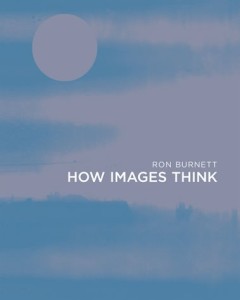
How images think
The transformation of images in the age of new media and the digital revolution.Digital images are an integral part of all media, including television, film, photography, animation, video games, data visualization, and the Internet. In the digital world, spectators become navigators wending their way through a variety of interactive experiences, and images become spaces of visualization with mo…
- Edition
- -
- ISBN/ISSN
- 9780262269568
- Collation
- 1 online resource (xxi, 253 pages) : illustrations
- Series Title
- -
- Call Number
- 006 BUR h
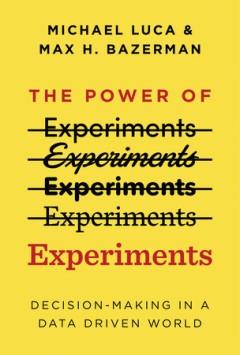
The power of experiments :decision making in a data-driven world
How organizations--including Google, StubHub, Airbnb, and Facebook--learn from experiments in a data-driven world.OCLC-licensed vendor bibliographic record.
- Edition
- -
- ISBN/ISSN
- 9780262358255
- Collation
- 1 online resource (xiv, 211 pages)
- Series Title
- -
- Call Number
- -
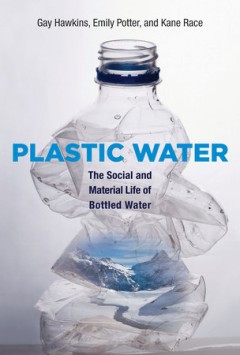
Plastic water: The social and material life of bottled water
How did branded bottles of water insinuate themselves into our daily lives? Why did water become an economic good—no longer a common resource but a commercial product, in industry parlance a “fast moving consumer good,” or FMCG? Plastic Water examines the processes behind this transformation. It goes beyond the usual political and environmental critiques of bottled water to investigate it…
- Edition
- -
- ISBN/ISSN
- 9780262329521
- Collation
- 1 online resource (xxiv, 260 pages) :illustrations
- Series Title
- -
- Call Number
- -

Better than conscious? : DECISION MAKING, the HUMAN MIND, and IMPLICATIONS FO…
Experts discuss the implications of the ways humans reach decisions through the conscious and subconscious processing of information. Conscious control enables human decision makers to override routines, to exercise willpower, to find innovative solutions, to learn by instruction, to decide collectively, and to justify their choices. These and many more advantages, however, come at a price: the…
- Edition
- -
- ISBN/ISSN
- -
- Collation
- 1 online resource (xiv, 449 pages) : illustrations (some color).
- Series Title
- -
- Call Number
- -

Better than conscious? : DECISION MAKING, the HUMAN MIND, and IMPLICATIONS FO…
Experts discuss the implications of the ways humans reach decisions through the conscious and subconscious processing of information. Conscious control enables human decision makers to override routines, to exercise willpower, to find innovative solutions, to learn by instruction, to decide collectively, and to justify their choices. These and many more advantages, however, come at a price: the…
- Edition
- -
- ISBN/ISSN
- -
- Collation
- 1 online resource (xiv, 449 pages) : illustrations (some color).
- Series Title
- -
- Call Number
- -
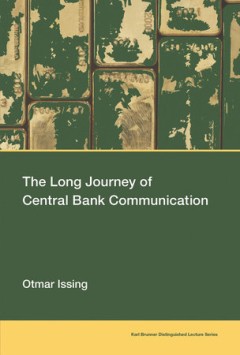
The long journey of central bank communication
Central bank communication has evolved from secretiveness to transparency and accountability—from a reluctance to give out any information at all to the belief in communication as a panacea for effective policy. In this book, Otmar Issing, himself a former central banker, discusses the journey toward transparency in central bank communication. Issing traces the development of transparency, ex…
- Edition
- -
- ISBN/ISSN
- 9780262355995
- Collation
- 1 online resource (104 pages).
- Series Title
- -
- Call Number
- -

Japan's bubble, deflation, and long-term stagnation
Japan's economic bubble burst in the early 1990s, and the country entered its famous “lost decade”—a period of stagnation and economic disruption that persisted until 2003. The current declines in global equity and real estate markets have eerie parallels to Japan's economic woes of the 1990s. If we are to avoid repeating Japan's experience on a global scale, we must understand what happe…
- Edition
- -
- ISBN/ISSN
- 9780262289467
- Collation
- 1 online resource (xi, 420 pages) :illustrations
- Series Title
- -
- Call Number
- -

Streetlights and shadows :searching for the keys to adaptive decision making
In making decisions, when should we go with our gut and when should we try to analyze every option? When should we use our intuition and when should we rely on logic and statistics? Most of us would probably agree that for important decisions, we should follow certain guidelines—gather as much information as possible, compare the options, pin down the goals before getting started. But in prac…
- Edition
- -
- ISBN/ISSN
- 9780262259019
- Collation
- 1 online resource (xi, 337 pages) :illustrations, maps
- Series Title
- -
- Call Number
- -
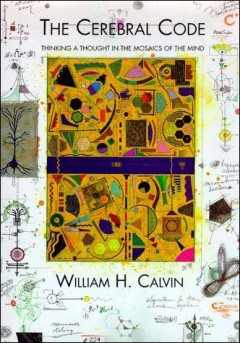
The Cerebral Code: Thinking a Thought in the Mosaics of the Mind
"A Bradford book."The Cerebral Code proposes a bold new theory for how Darwin's evolutionary processes could operate in the brain, improving ideas on the time scale of thought and action. Jung said that dreaming goes on continuously but you can't see it when you're awake, just as you can't see the stars in the daylight because it is too bright. Calvin's is a theory for what goes on, hidden from…
- Edition
- -
- ISBN/ISSN
- 9780262269711
- Collation
- 1 online resource (256 pages) :illustrations
- Series Title
- -
- Call Number
- -
 Computer Science, Information & General Works
Computer Science, Information & General Works  Philosophy & Psychology
Philosophy & Psychology  Religion
Religion  Social Sciences
Social Sciences  Language
Language  Pure Science
Pure Science  Applied Sciences
Applied Sciences  Art & Recreation
Art & Recreation  Literature
Literature  History & Geography
History & Geography